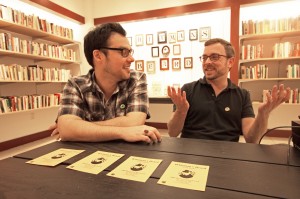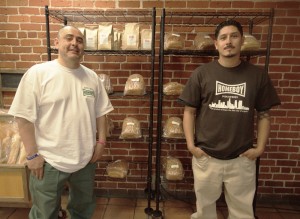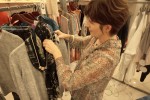A&E contributors
About 25 years ago, Father Gregory Boyle had an idea that led to a simple program that would help former gang members.
Homeboy Industries is one of the pop-up shops occupying an empty Westwood space this month. A Los Angeles-based organization founded by Father Gregory Boyle, Homeboy Industries specializes in providing ex-gang members with job opportunities.
The beginnings of Homeboy Industries were inspired by Father Boyle’s work with high-risk youths and former gang members at Dolores Mission Church. With a snow-white beard and kind smile, Father Boyle, or “Father G” as he’s affectionately called, is a 59-year-old American Jesuit priest.
Father Boyle started as a pastor at Dolores Mission Church in 1986 during a turbulent time in L.A. gang history. After witnessing firsthand the lives of people involved in gangs, he took his work and involvement at Dolores Mission Church one step further.
First, Father Boyle started a program at the mission offering academic schooling and job opportunities to former gang members. In 25 years, Boyle said the program evolved to become one of the largest gang intervention and rehab programs in the United States.
His programs grew to become Homeboy Industries, which now offers tattoo removal, educational services and mental health services.
The job programs provided by Homeboy Industries offer participants employment in several different trades, including Homeboy Bakery, Homegirl Café & Catering, and Homeboy Silkscreen & Embroidery.
Baked goods, coffee, food and clothing items are all now being sold at the Homeboy Industries shop in Westwood, where the staff, employed by Father Boyle and other managers, can continue working and contributing to the public.
Cesar Ulloa, one of the business managers of the site, is one of the many who took advantage of the opportunities that Homeboy Industries provides.
Ulloa heard from a good friend about Homeboy Industries and spent more than a year completing the different programs that Homeboy offers. Taking advantage of the resources offered, he took the General Educational Development test and other classes before getting hired and becoming business manager of three Homeboy sites.
“I was tired of being tired already. I’d been in the street running my own life for over 27 years. I got tired of drugs; I got tired of the life. I got tired of being in and out of jail,” Ulloa said. “I’d seen one of my childhood friends, and I saw what he had, and I wanted that in my own version.”
Just as Homeboy Industries gives new chances to many former gang members, its collaboration with Arts ReSTORE LA will help to revitalize a part of Westwood.

Kevin Truong
Bruin senior staff
ktruong@media.ucla.edu
The original caption accompanying this article contained an error and has been changed. See the bottom of the article for additional information.
Stephen Rohal first met Rama Bauer on the East Coast by answering an ad looking for a guitarist in an alternative rock band.
After almost 20 years and a move to the other side of the country, the two friends have launched a pop-up used bookstore called Whitman’s Beard as part of the Arts ReSTORE LA program in Westwood.
Whitman’s Beard got its start in the program after hosting a temporary used book sale on the top floor of the now-closed Westwood Brewing Company. A chance visit to the sale by one of the project managers of the Arts ReSTORE LA project led to them being chosen as one of the vendors participating in the program.
Rohal and Bauer said the idea of opening a used bookstore came from the noticeable lack of a bookstore in Westwood that could serve as a meeting place for different members of the community.
Bauer said being chosen for the project is a huge boon to the young business.
“Unlike a lot of the other vendors here we don’t have a selling presence, either online or at brick-and-mortar store,” Bauer said. “This is more untested so it’s a huge opportunity and I can’t believe we were even picked for this.”
The two business partners and co-owners of Whitman’s Beard both have full facial hair and horn-rimmed glasses, but according to Rohal their contrasting personalities sometimes lead to late-night arguments over their ideas about running the business.
“It’s been me fighting his great ideas, one step at a time, but hopefully it makes him synthesize them a little better,” Rohal said.
Although he said there have been disagreements about the course and vision of the store, Rohal added their different ways of thinking complement each other when making decisions on their burgeoning store.
Bauer said he realizes the idea of a used bookstore strikes some people as antiquated, but pointed out the differences between a big chain bookstore or shopping online to a small independent store.
“I can’t tell you the number of times I went to a used bookstore looking for one thing, and on the shelf above or below, my eye catches something,” Bauer said. “I mean you pick up a used book and maybe someone wrote something on the margin or someone’s name is in there and it’s something that has its own history.”
Bauer said although the partners have received offers to do the pop-up in some galleries and spaces, their main focus is getting a permanent spot in Westwood Village.
“We want to have a place where we can have events, we can have readings, we can have music and we can have lectures,” Bauer said. “There was a place near Rutgers University that I went to where people could just go and give talks; it was a place to get ideas, and that’s what we want to do here.”
He added that he personally owes a debt to the independent bookstores in his hometown for giving him a sense of identity and helping to drive his zeal for learning.
“Being able to pick up authors and read something by Henry Miller, (Ralph Waldo) Emerson or (Jack) Kerouac, these were hugely influential in my life because I found that I’m not just this entity that’s floating around,” Bauer said. “They were other people who had felt like me, and I think that’s really important, a sense of connection.”
Arts ReSTORE LA is a month-long initiative by the Hammer Museum that aims to revitalize the culture of Westwood by bringing artisans and vendors to occupy empty storefronts.
Correction: In the photo accompanying this story, Rama Bauer is pictured on the left and Stephen Rohal on the right.

Kevin Truong
Bruin senior staff
ktruong@media.ucla.edu
The original caption accompanying this article contained an error and has been changed. See the bottom of the article for additional information.
Jennifer Parry Dodge’s first stint in Westwood was doing clinical rotations in the UCLA Ronald Reagan Medical Center during her time as a psychiatric nurse.
Now she’s back in the village as the curator and manager of ERMIE X Weltenbuerger, one of the pop-up boutiques that are part of the Arts ReSTORE LA project.
The store features Parry Dodge’s own work, which includes hand-dyeing textiles and clothing, as well as the clothing, textiles, art and handicrafts of around 40 to 50 other artists and designers.
After going to art school, where she studied printmaking, Parry Dodge said she got sick of working the assortment of random jobs that artists tend to do so she went back to school to become a psychiatric nurse.
Parry Dodge said working as a psychiatric nurse for three years at Kaiser Permanente left her burnt out and looking for a way to creatively express herself. This search led her to start taking photographs and eventually led to the creation of a blog.
“It got me into making things with my hands again and I started printing, screen-printing on fabric, making that into tote bags and very simple garments. Friends started to buy it, and it sort of took off from there,” she said. “That’s kind of how it got started, just being frustrated and wanting to make things again and be a happier person.”
Parry Dodge’s original experience with dyeing fabric came from her childhood. Growing up in Iowa during the 1970s, she and her mother would tie-dye on the kitchen stove.
She still keeps that dyeing tradition close to her home, by doing all her hand-dyeing in her backyard in Highland Park, a neighborhood in northeast Los Angeles.
Parry Dodge said her pop-up is the end result of her community of friends and collaborators coming together and helping out.
She added that she hopes to inspire others to try their own hand at pursuing their passions.
ERMIE, Parry Dodge’s own clothing brand, is named after her aunt who encouraged her to participate in her various creative endeavors.
“It’s kind of funny; I feel like I’ve taken on her role in encouraging people to make their work and to believe in themselves as she believed in me,” Parry Dodge said. “I feel like it’s a really good way to honor her memory.”
Correction: In the photo accompanying this story, Alex Rocio is pictured on the right and Jayme Puente on the left.
